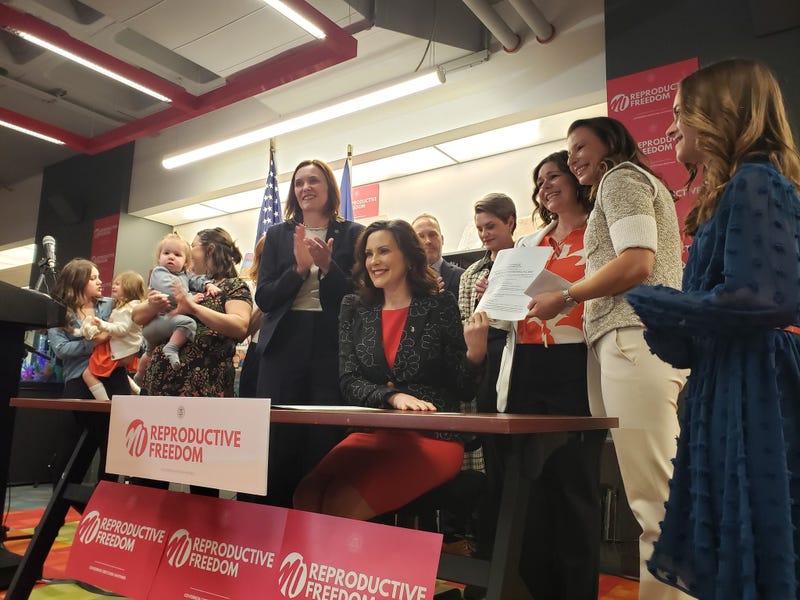
ROYAL OAK (WWJ) -- Gov. Gretchen Whitmer has formally signed the Michigan Family Protection Act into law, eliminating the threat of criminal penalty for compensated surrogacy.
WWJ's Jon Hewett reports Michigan was the only state remaining with such a law on the books.
That's something Whitmer noted as she signed the nine bill package during a visit to the Royal Oak Public Library on Monday, repealing the 1988 ban she the governor called cruel and archaic.
"To be the last state to recognize that surrogacy is an honorable, important scientific way for people to grow families...it's kind of, you know, a shame that it took Michigan this long," the governor said. "But I'm thrilled that, with our new democratic majority in Lansing, we were able to get it done."
The Michigan Family Protection Act is comprised of nine bills — House Bills 5207 through 5215. Together, the bills support parents as well as children born through surrogacy or IVF, as well as LGBTQ+ parents.
According to the governor's office, specifically, the bills will:
• Legalize and regulate surrogacy, allowing Michiganders to have children in an environment that protects the children, the parents, and the surrogates.
• Align with the best practices by ensuring that individuals who serve as surrogates are fairly compensated, have their own legal representation, and are screened by medical professionals before entering into an agreement.
• Ensure children born by surrogacy and assisted reproductive technology (including IVF) are treated equally under the law.
• Change outdated state law to treat LGBTQ+ families equally and eliminate the need for them to go through a costly and invasive process to get documentation confirming their parental status. Even if they move to a state that does not respect these basic rights, these bills help ensure they cannot be denied their relationship to their child.
• Make it easier and cheaper for all Michigan families to get formal recognition of their parental relationship to their children.
Michigan's law had forced couples to fight legally to adopt their biological children in the eyes of the law, as the children bore the name of the surrogate mother at birth.
Whitmer said these bills will do a lot to ensure better protections for surrogates, parents, and children to better support those who choose to start families in Michigan.
Many people, Whitmer asserted, have said we'd never be in a place in this country where surrogacy, IVF and contraception would be threatened — let alone abortion — but here we are.
"Extreme politicians are putting themselves in your doctor's office, between private discussions that should be left to you and your family," Whitmer said. "And in the years since the overturn of Roe (vs Wade), they've gotten bolder. In Texas, lawmakers banned abortions and zero exceptions for rape or incest. Earlier this month, Arizona blocked a proposal to protect birth control. Last month in Alabama, the Supreme Court placed IVF in jeopardy, and just last week the U.S. Supreme Court heard arguments in a case to ban Mifepristone, a common abortion and miscarriage drug."
This move in Michigan comes as bills have been introduced in over a dozen other states and at the federal level that would ban IVF.
